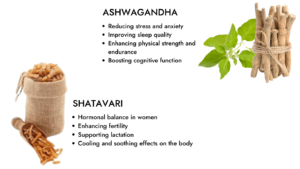In the world of Ayurveda, two herbs have consistently stood out for their incredible health benefits: Shatavari and Ashwagandha. Both are revered for their adaptogenic properties, helping the body combat stress, boost energy, and promote overall well-being.
But despite their similarities, they cater to different needs and have unique properties that make them suitable for specific health goals. In this blog, we’ll dive deep into their origins, benefits, side effects, and the factors to consider when choosing between Shatavari and Ashwagandha.
Understanding Shatavari and Ashwagandha

What is Shatavari?
Shatavari (Asparagus racemosus) is a medicinal herb primarily used in Ayurveda to support female reproductive health. Known as the “Queen of Herbs,” Shatavari is a member of the asparagus family and thrives in tropical and subtropical regions of India, Sri Lanka, and the Himalayas.
To Learn More You Can Read :What is Shatavari and Why is it called the Queen of Herbs
Key Traditional Uses of Shatavari:
- Hormonal balance in women
- Enhancing fertility
- Supporting lactation
- Cooling and soothing effects on the body
What is Ashwagandha?
Ashwagandha (Withania somnifera), often called the “King of Herbs,” is a powerful adaptogen widely used to combat stress, improve energy levels, and enhance mental clarity. Native to India, the Middle East, and parts of Africa, Ashwagandha translates to “the smell of a horse,” referring to its strong odor and the belief that it imparts the strength and vitality of a horse.
Key Traditional Uses of Ashwagandha:
- Reducing stress and anxiety
- Improving sleep quality
- Enhancing physical strength and endurance
- Boosting cognitive function
Shatavari vs. Ashwagandha: Nutritional and Medicinal Profile

1. Primary Benefits of Shatavari:
- Female Reproductive Health: Shatavari is renowned for balancing hormones, regulating menstrual cycles, and addressing conditions like PMS and menopause symptoms.
- Lactation Support: It helps boost milk production in breastfeeding mothers.
- Digestive Health: Shatavari supports a healthy digestive system and can alleviate symptoms of acid reflux and gastritis.
- Cooling Effect: It has a naturally cooling effect on the body, which helps reduce inflammation and internal heat.
- Immune Booster: Shatavari strengthens the immune system and helps combat infections.
2. Primary Benefits of Ashwagandha:
- Stress and Anxiety Relief: Ashwagandha reduces cortisol levels, the hormone responsible for stress.
- Improved Sleep: It promotes restful sleep and reduces symptoms of insomnia.
- Physical Endurance: Ashwagandha boosts stamina, strength, and muscle recovery, making it popular among athletes.
- Cognitive Function: It improves memory, focus, and overall brain health.
- Hormonal Balance in Men: Ashwagandha supports testosterone production and enhances male fertility.
Related Read: How Ashwagandha Works-A Deep Dive into its Mechanisms
Shatavari vs. Ashwagandha: Key Differences

| Criteria | Shatavari | Ashwagandha |
| Primary Use | Female reproductive health and cooling the body | Stress relief, energy, and physical strength |
| Best for | Women dealing with hormonal imbalances, PMS, or menopause | Men and women dealing with stress, fatigue, and low energy |
| Effect on Stress | Indirectly supports stress by balancing hormones | Directly reduces cortisol and stress response |
| Body Temperature Effect | Cooling | Warming |
| Immune Support | Boosts immunity, supports recovery from illness | Enhances immunity by reducing stress-related damage |
| Best Time to Take | Morning or evening | Evening for sleep or morning for energy |
| Forms Available | Powder, tablets, liquid extract | Powder, tablets, capsules |
Shatavari for Women: A Closer Look

Shatavari is often the go-to herb for women due to its profound impact on hormonal health.
- Hormonal Imbalance: It can help regulate estrogen levels, offering relief from symptoms like mood swings, cramps, and hot flashes.
- Pregnancy and Lactation: Shatavari is highly recommended for pregnant and breastfeeding women as it enhances milk production.
- Polycystic Ovary Syndrome (PCOS): Regular consumption of Shatavari may help manage PCOS symptoms by balancing hormones and improving ovarian function.
Related Read: How Shatavari Supports Women Health
Who Should Use Shatavari?
- Women experiencing PMS or menopause symptoms
- Women trying to conceive
- Breastfeeding mothers
- Individuals with digestive disorders
How to Take Shatavari:
- 1-2 teaspoons of Shatavari powder mixed with warm milk or water daily
- Shatavari supplements as directed by a healthcare provider
Ashwagandha for Stress and Energy: A Closer Look

Ashwagandha is celebrated for its adaptogenic and revitalizing effects on the body and mind.
- Stress Management: Regular intake helps lower cortisol levels, reducing chronic stress and anxiety.
- Enhanced Athletic Performance: Athletes often use Ashwagandha to improve strength, stamina, and muscle recovery.
- Cognitive Health: It supports brain function, improving memory, focus, and clarity.
- Better Sleep: Ashwagandha promotes deep, restorative sleep, making it ideal for individuals suffering from insomnia.
Who Should Use Ashwagandha?
- Individuals experiencing high stress or anxiety
- People with poor sleep quality
- Athletes or fitness enthusiasts
- Those struggling with fatigue or low energy
How to Take Ashwagandha:
- 1 teaspoon of Ashwagandha powder mixed with warm milk before bedtime
- Ashwagandha capsules or tablets as recommended by a healthcare provider
Can You Take Shatavari and Ashwagandha Together?
Yes! Shatavari and Ashwagandha can complement each other beautifully when used together, provided they align with your health goals.
When to Take Them Together:
- For Women Under Chronic Stress: Shatavari supports hormonal balance, while Ashwagandha directly combats cortisol levels.
- During Menopause: The cooling effects of Shatavari and the stress-relieving benefits of Ashwagandha can ease symptoms like mood swings and hot flashes.
- General Wellness: Both herbs together can offer a holistic approach to mental, physical, and emotional well-being.
Recommended Combination Dosage:
- Consult an Ayurvedic practitioner for personalized advice, but typically, combining small doses of both herbs is considered safe.
Side Effects and Precautions
Shatavari Side Effects:
- Allergic reactions in rare cases
- May not be suitable for individuals with estrogen-sensitive conditions (e.g., breast cancer)
Ashwagandha Side Effects:
- Excessive intake may cause gastrointestinal discomfort
- Not recommended during pregnancy without medical supervision
- May interact with certain medications, including sedatives and thyroid drugs
General Precautions:
- Always consult a healthcare provider before starting herbal supplements, especially if you’re pregnant, nursing, or on medications.
Conclusion: Which Herb is Right for You?
- Choose Shatavari if you’re a woman seeking hormonal balance, fertility support, or relief from menopause symptoms.
- Opt for Ashwagandha if you’re dealing with stress, anxiety, poor sleep, or looking to enhance physical performance and energy.
- For a holistic approach, combining both herbs can provide synergistic benefits.
Both Shatavari and Ashwagandha are powerful herbs with centuries of proven efficacy. Understanding your body’s unique needs and consulting a healthcare professional can help you make the best choice for your health journey.
Your health is your wealth—choose the herb that aligns with your goals and embrace the power of Ayurveda!

